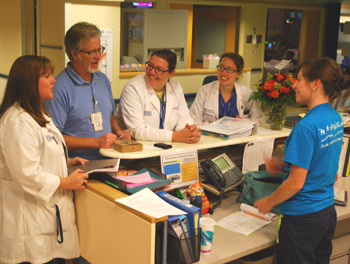With the breadth of clinical and basic science research at Duke, there are extensive research opportunities available to critical care fellows and strong protected research time.
In the first year, fellows are encouraged to participate in a clinical research project and are introduced to the diverse research opportunities within and outside of the Division of Pediatric Critical Care Medicine.

The major focus of the research experience is to learn how to design a hypothesis-driven research project, acquire the necessary technical skills to test the hypothesis, analyze the data, and present the work. Our fellows have been highly successful presenting their work at national meetings and completing at least one first author manuscript. Fellows have been recognized for the quality of their research with research awards at national meetings (Society of Critical Care Medicine and American Thoracic Society), regional meetings, and local research symposiums within the Departments of Pediatrics and Anesthesiology. The Division provides funds yearly for each fellow to attend a meeting to present their research.
The Pediatric Critical Care Medicine fellows spend approximately 60% of their total training time in the research setting. The PCCM fellows have the opportunity to choose from basic science, translational, and clinical projects. Fellows may select research options from the entire Duke Medicine community, including the Duke Clinical Research Institute. An overview of the potential research options from within the Pediatric Critical Care and Pediatric Anesthesiology Divisions are summarized below.

Strong research collaborations are ongoing within the Department of Pediatrics between the Division of Pediatric Critical Care and the Divisions of Pediatric Pulmonary Medicine, Cardiology, and Neonatology. Pediatric Critical Care is actively involved with the Neonatal-Perinatal Research Institute, a multidisciplinary group which engages in research primarily related to developmental aspects of lung injury and brain injury. The PCCM Division also has long-standing collaborations with researchers in other Departments including Cardiovascular Anesthesiology, Cardiovascular Surgery, Adult Pulmonary/Critical Care Medicine, and the Multidisciplinary Neuroprotective Laboratory.
Several members of the Division of Pediatric Critical Care (both faculty and fellow) have matriculated at the Duke University Clinical Research Institute which offers formalized academic training in the quantitative and methodological principles of clinical research, including courses in research design, statistical analysis, health economics, research ethics, and research management.
Fellow Research Projects
Examples of ongoing and completed fellow research projects:
- Alterations in beta-adrenergic receptor function in the myocardium of pediatric and adult patients undergoing cardiopulmonary bypass.
- Regulation of gene expression of a lung anion exchange protein with oxidative stress in human respiratory epithelial cells.
- Role of Apo E in the development of traumatic brain injury in a murine model of closed head injury.
- The effects of heliox on gas exchange during high-frequency oscillatory ventilation in a neonatal porcine model of acute lung injury.
- Regulation of the secretion of active extracellular superoxide dismutase in developing lungs by hypoxia and hyperoxia.
- The use of dead space to total ventilation (Vd/Vt) ratio in predicting successful extubation in infants and children.
- Mechanisms of red cell dysfunction and ATP transport in a murine sepsis model.
- Measuring the effect of socio-economic health disparities in patients admitted to the PICU with sepsis and asthma.
- Pharmacokinetic studies of multiple drugs in crtically ill children and children on extracorporeal support.
- A randomized trial of plasma infusion and its effects on ECMO circuit longevity.
- An economic analysis of patients bridged to lung transplant with ambulatory ECMO (compared to historical controls).
- Development of new safety culture metrics and evaluating associations to clinical outcomes (such as CLABSIs).
- Using existing data sets to model large clinical trials.
- Development of a novel device for intravascular oxygen delivery in a porcine model.
- Using quality improvement methodology and code review to reduce in-hospital cardiac arrest.
- Qualitative analysis of perceptions around end-of-life care for children of Muslim parents.